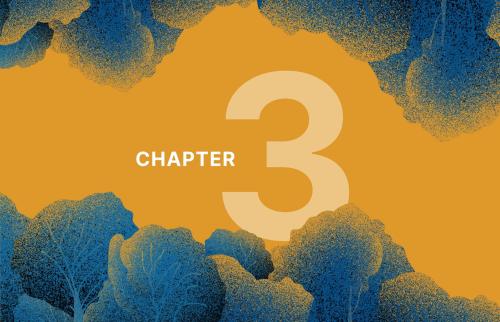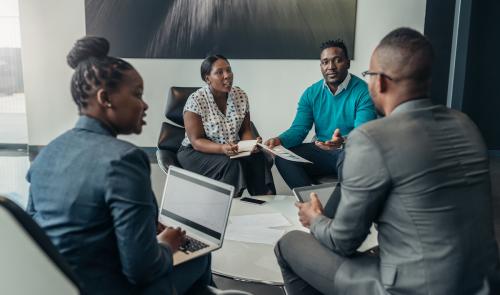This viewpoint is part of Foresight Africa 2024.
Africa stands at a crossroads, facing both unprecedented opportunity and daunting challenges on the path to realizing its demographic dividend. With a youthful population that could potentially fuel a transformative wave of economic growth and development, the continent is poised for significant progress. However, several formidable hurdles stand in its way. Among these challenges, the role of medium, small, and micro enterprises (MSMEs) emerges as a critical factor, with limited access to finance and loans, stringent collateral requirements, and a lack of capacity-building opportunities posing significant barriers to the growth of these businesses. Furthermore, the broader issue of financial inclusion amplifies these challenges. In addressing these multifaceted problems, Africa must overcome these hurdles to harness the promise of its youthful population, ultimately turning demographic potential into lasting socioeconomic progress.
In line with our mission to set standards for sustainable business practices, Access Bank has been intentional about providing innovative solutions for the markets and communities we serve, bridging the gaps in access to finance and capacity building for entrepreneurs. Our lending proposition provides affordable financing with flexible collateral options for MSMEs. Currently, we have a bouquet of over 20 loan offerings targeted at different sectors.
We, however, find that access to knowledge and market remain two major reasons MSMEs in Africa are unable to access finance.1 This is because MSMEs are typically informal, unregistered, do not keep financial records, lack succession planning, and have sales restricted to single locations.
To bridge these gaps, we strive to go beyond banking, providing access to trainings, advisory services, networking, and discount offerings to broaden the knowledge of MSMEs. In doing this, we aim to help these businesses improve their basic practices and ultimately help them boost their profitability.
Through the AccesSMEZone—our online, real time Learning Management Platform— which is the first of its kind in the Nigerian banking industry, MSMEs can access free courses on various business topics. Our capacity building programs have impacted over 200,000 MSMEs within the last five years, with over 25,000 trained.
Over the years, we have supported Africa’s economic growth by helping more than 20,000 enterprises grow and create more jobs, by accessing over $232 million in financing. About one-third of the beneficiaries of this lending methodology are women-led/owned MSMEs who have accessed finance through our W-Power Loan for women—discounted financing priced significantly below market lending rates.
Why is this important?
Put simply, Africa has the highest proportion of women entrepreneurs in the world, with OECD research revealing that more than a quarter of all businesses on the continent are in the process of starting or managing a business.2 In the same vein, this means, our female entrepreneurs have a great potential to contribute to the growth of the continent’s economy, if maximized. It is with this vision that we established the “W” Initiative, to provide women with capacity building, mentoring programs, and maternal health services.
With a presence in 13 African countries, the Access Bank “W” Initiative has been able to make an indelible mark across the continent, impacting over 3,145,310 women.3
Despite the evident strides that the Bank and other like-minded institutions have made to bridge the financing and inclusion gap, there remains a disconnect between financiers and the underserved populace.
In addressing these multifaceted problems, Africa must overcome these hurdles to harness the promise of its youthful population, ultimately turning demographic potential into lasting socioeconomic progress.
The key issues? Accessibility, simplicity, and trust
While concerns around accessibility are being addressed through agency banking and other mobile and internet banking options like USSD, simplicity and trust are still a work in progress. To address the issue of simplicity, Access Bank developed the Access Money Wallet and Access Wallet products. Through these offerings, a customer’s mobile number can serve as a prepaid store of value while they are also empowered to create unique bank account numbers. Over 11.9 million accounts have been opened under this initiative in the last three years. Also, through the “Access Closa” agent banking product, we have been able to cascade the positives of being part of the formal banking sector to millions of Africans. Approximately three million accounts have been opened since this initiative’s inception. To widely address the issue of trust, however, more proactive financial literacy programs and community outreach initiatives need to be implemented to demystify banking processes, build awareness, and establish trust.
As we deepen our implementation of these initiatives, we continue to learn valuable lessons along the way. One of these lessons is that to fully realize Africa’s demographic dividend, a comprehensive set of policies and strategies must be implemented.
First, governments must prioritize investments in tangible education and skill development for youths, entrepreneurs, and women, ensuring that high-quality education is accessible to all—particularly girls and marginalized communities. Gender equality should be promoted through policies that empower women and girls, including initiatives that combat gender-based violence; ensure equal access to education and economic opportunities; as well as promote maternal and child health, family planning, and disease prevention. Job creation policies must be formulated to stimulate economic growth and diversify economies beyond resource dependence, with an emphasis on supporting MSMEs and fostering innovation. These policies, when implemented effectively and concurrently, can pave the way for Africa to harness its demographic dividend and achieve sustainable development.
We must remember, Africa’s demographic dividend is not guaranteed. The window of opportunity is narrowing, and the time to act is now! With an understanding of the magnitude of the challenge, we also know this is a window that Africa cannot afford to miss. This drives us to take our commitment to impact seriously. Annually, we dedicate 1% of our profit-before-tax to sustainability.4 However, we cannot do it alone. Governments, businesses, civil society, and international partners must come together to create an environment that fosters human capital development, economic growth, and social progress.
-
Footnotes
- UNDESA. 2021. PDF-SDG-2021-01. “Strengthening national capacities for enhancing MSME resilience and building forward better to accelerate the implementation of the 2030 Agenda in developing countries participating in the Belt and Road Initiative.” https://www.un.org/en/unpdf/sdg-2021-01.
- Anzetse Were. 4 October 2022. OECD Development Matters. “How women stabilize and grow economies in Africa.”
- Access Bank. 2022 Annual Report and Accounts. “Building Bridges; Connecting the Future.” https://www.accessbankplc.com/annual-report/AccessBank_2022_Annual_Report.pdf.
- Access Bank. February 2020. Access Bank PLC Sustainability Policy. https://investorrelations.accessbankplc.com/ Accessbankgroup/media/Documents/corp-governance/Sustainability-Policy.pdf.
The Brookings Institution is committed to quality, independence, and impact.
We are supported by a diverse array of funders. In line with our values and policies, each Brookings publication represents the sole views of its author(s).







Commentary
Realizing Africa’s demographic dividend: A call to action
March 8, 2024